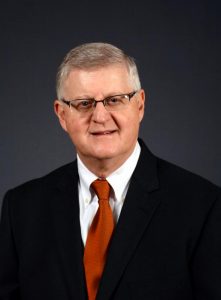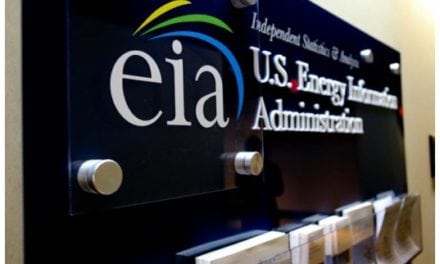By Keith Reid
As the new year was arriving Fuels Market News reached out to association leaders throughout the industry to get some feedback on what their organizations accomplished in 2018 and what they anticipated for 2019. FMN would like to thank those who were able to respond in a timely manner during the busy holiday season.
Henry Armour, NACS President & CEO
NACS advances the role of convenience stores as positive economic, social and philanthropic contributors to the communities they serve. The U.S. convenience store industry, with more than 154,000 stores nationwide selling fuel, food and merchandise, serves 160 million customers daily—half of the U.S. population—and has sales that are 10.8% of total U.S. retail and foodservice sales. NACS has 2,100 retailer and 1,750 supplier members from more than 50 countries.
What would you consider the association’s major accomplishments in 2018?
If there were a theme to 2018, it would be strength in numbers. Despite all the disruption that is redefining the broader retail industry and all the issues—both legislative and regulatory—that threaten our industry, 2018 was another strong year for our industry. And much of this strength can be attributed to how our industry works together, both through NACS and with other groups, to find common ground for issues and concerns related to the industry.
NACS’ biggest accomplishments in 2018 are not just about the end game of “winning” a vote or helping to define an issue but are about the process of working together as an industry—or with other industries—to define how we can accomplish more together. Here are three examples:
- To address payment card and technology standards, we, along with other retail trade groups and debit networks, created the Secure Payments Partnership (securepaymentspartnership.com), an advocacy group focused on promoting security across the U.S. payments system.
- To address payment costs, we worked with Congress on the 2018 Farm Bill that includes a ban on processing fees on electronic benefits transfer (EBT) transactions and reiterates the ban on interchange fees.
- In response to the U.S. Food and Drug Administration’s announcement to restrict the sale of flavored e-cigarettes to adult-only stores, we met with the White House Office of Public Liaison and the Domestic Policy Council, as well as the FDA and shared our concerns about the FDA’s action and offered policy proposals. And, our members responded when we asked them to make their voice heard: Convenience retailers sent more than 5,000 letters to Capitol Hill about the issue.
These are high-profile examples of the work we do every day, behind the scenes, to tell our industry’s story to legislators, the media and other key opinion-leaders. And it’s something we will continue in 2019, whether these issues or many others, including a litany of fueling issues.
What are the top initiatives and issues NACS expects to address in 2019?
While we know that there are many issues that could be upon us in 2019, whether related to electric vehicles, new technologies that continue to redefine convenience or how legalized sports betting or marijuana sales could play a bigger role in our channel, there is one thing that we do know. Disruptions to traditional business models are all around and that forces all businesses to continue to innovate and find new ways to stay ahead of the competition. The good news is that you don’t have to do it alone. We can serve as your voice and there is strength in numbers. We all do better when we are all engaged.
Why should a convenience store operator consider NACS membership or become involved with NACS activities?
Most of all, the power of NACS is about how we as an industry come together to make each other better. A record 25,000-plus attendees were at the 2018 NACS Show to learn new ideas in sessions, see new products on the expo floor and connect with each other during networking opportunities. Those opportunities to deliver knowledge and connections, plus advocacy, is something that we do at other focused events throughout the year, whether our acclaimed Leadership Education Programs, our State of the Industry Summit or our Global Summits in Europe and Asia.
These are more than events; they are opportunities for members to learn about issues on a global scale. And, that’s important because issues around the world are in in varying stages of their life cycle. In Asia, technology defines convenience to a much greater extent, while in Europe, fresh is the focus. Both broad trends will have a profound impact on how you go to market.
Lisa Mullings, chief executive for both NATSO and the NATSO Foundation.
NATSO has been representing travel plaza and truckstop owners and operators for over 50 years and pursues a clear mission: to advance the success of truckstop and travel plaza members by delivering solutions to members’ challenges and achieving the public policy goals of the truckstop and travel plaza industry. It represents more than 1,700 travel plazas and truckstops nationwide, owned by over 200 corporate entities.
What would you consider the association’s major accomplishments in 2018?
NATSO recently launched the Alternative Fuels Council to help fuel retailers leverage the resources necessary to learn about and incorporate alternative fuels into their supply offerings. The Council already has put a number of compelling products on the market, including a RIN Management Service that helps fuel retailers that blend and sell renewable fuels to more efficiently participate in the Renewable Fuel Standard (RFS) program and manage their Renewable Identification Numbers (RINs).
Bringing new fuels to market is a complex and time-consuming task and through the Alternative Fuels Council retailers have access to highly skilled professionals who can help them expedite the process while also accurately meeting their compliance needs. On the policy side, early in 2018, Congress passed legislation providing for a retroactive biodiesel blenders’ tax credit for 2017, marking a victory for our industry and allowing fuel retailers to sell biodiesel at a price that is cost competitive with gasoline and diesel. NATSO also beat back plans by the Administration to increase interstate tolling and commercialize rest areas.
What are the top initiatives and issues NATSO expects to address in 2019?
As the association representing truckstops and travel plazas, we pay particular attention to infrastructure financing, truck fuels policies and other issues that uniquely affect our industry. Our members have a particular interest in the safe and efficient interstate movement of freight and people, since most NATSO locations operate at major highway interchanges and serve professional drivers and other interstate travelers. We’ve led efforts to support smart infrastructure investment and oppose poor financing schemes such as road tolling and commercial rest areas.
In 2019, NATSO will continue to advocate for policies that will support a diverse array of fuel supply options. Such policies, which include the Renewable Fuel Standard and the Biodiesel Tax Credit, lower our members’ cost of goods sold. We are actively pushing Congress to extend the Biodiesel Tax Credit, which expired at the end of 2016. The expiration of that credit has created a lot of market uncertainty and makes it difficult for fuel retailers to invest and plan for the future.
We will also continue urging the Environmental Protection Agency to halt its practice of granting waivers exempting small refineries from their obligations under the Renewable Fuel Standard. EPA has the authority to grant waivers exempting small refineries from their obligations under the RFS if they can prove that it would cause them a disproportionate economic hardship. But in 2018, EPA granted an unprecedented number of these hardship waivers, even to refineries that are owned and operated by some of the most profitable refining companies in the world. Without a transparent process to guide the assessment of these small refinery waiver requests, the exemptions will continue to undermine the law’s intent and decrease demand for biofuels.
Why should a truckstop or travel plaza operator consider NATSO membership or become involved with NATSO activities?
NATSO serves truckstops, travel centers and other diesel fuel retailers exclusively through advocacy, information and collaboration.
The Alternative Fuels Council will certainly continue to be a priority focus for us this year as we seek to remove the hurdles that stand in the way of many fuel retailers from entering the alternative fuels markets. One of the things of which I’m most proud is that whenever we engage with our members, we provide solutions that translate into real dollars without having to spend a lot of capital. All of our members, for example, have an opportunity to participate in our retail profitability program.
NATSO visits member locations to provide expert advice on site/store layout, merchandising and other aspects of their operations. We do the hard digging, and we leave them with actionable, executable ideas that help increase their profitability with little or no money. While this is something we’ve been doing for several years, we are planning to increase our resources to reach more of our members because it really does improve their bottom lines.
Rob Underwood, PMAA President
The Petroleum Marketers Association of America is a bit different from the traditional industry association. PMAA is a federation of 47 state and regional trade associations representing approximately 8,000 independent petroleum marketers nationwide. When a petroleum marketing company joins the state association, that automatically qualifies them as PMAA member companies.
What would you consider the association’s major accomplishments in 2018?
Last year was a busy one for the association. Some quick accomplishments from 2018:
- EPA approved PMAA’s low liquid level integrity test as an alternative method for containment sump testing that is required under the 2015 federal underground storage tank (UST) regulations. PMAA’s alternative test method will significantly reduce reoccurring sump testing compliance costs for tank owners. PMAA continues to work with ASTM and other groups to develop additional compliance cost saving tests that do not require introducing water into the sump and spill bucket.
- PMAA continued to lead the way in disaster response efforts by reforming the waiver process, clearing regulatory hurdles, minimizing delays at weigh stations and speeding wait times at water-borne terminals. PMAA also established the PMAA Disaster Fuel Response Program, a critically necessary link between marketers available to provide fuel to disaster areas and those in need of such fuel.
- PMAA protected marketers at ASTM by voting against efforts to place the point of compliance for fuel quality at the retailer, which potentially would require retailers to test fuel instead of terminal operators to avoid potential fuel related liability.
- PMAA secured a 10-year reauthorization of the National Oilheat Research Alliance (NORA), which helps the heating fuels industry with professional education, improving energy efficiency and safety and research consumer education.
- PMAA worked to keep the doubled estate tax exemption in place and making sure the step-up in basis (which provides that there is no capital gains tax due from a decedent) remains in place.
What are the top initiatives and issues PMAA expects to address in 2019?
Many of the issues PMAA worked on in 2018 will be key issues for petroleum marketers in 2019:
- PMAA filed a brief in the Visa and Mastercard swipe fee litigation now pending in U.S. District Court in New York. The purpose of the brief is to oppose any settlement of the case that shuts out branded marketers from filing claims against the $6.24 billion settlement fund.
- PMAA filed comments in support of the Trump Administration’s efforts to pare back the Obama Administration’s costly corporate average fuel economy (CAFE) standard final rule that would likely require more electric vehicles (EVs) in the marketplace. PMAA highlighted multiple petroleum marketing concerns and the need to rewrite the rule to reflect marketplace reality. The Trump Administration has yet to issue a final rule.
- PMAA continued to highlight concerns with the RFS and the need to reduce the corn ethanol mandate. While the Trump Administration has yet to reduce the mandate, it issued exemptions to refiners, which has indirectly reduced the mandate, providing for a level playing field in the marketplace and preventing an E15 mandate across the country.
- PMAA submitted a proposal to the National Conference on Weights and Measures (NCWM) to require transparency in the marketing and branding of E15 fuels by requiring the term “E15” to be included in marketing of E15 such as “Unleaded 88 E15.” The proposal is on the agenda for the NCWM 2019 Interim Meeting.
- PMAA participated in task groups addressing potential implementation issues regarding refiner efforts to move towards a 95 RON fuel which could potentially be required in new vehicles starting with the 2023 model year and ultimately replace today’s 87, 89 and 91 octane fuel slate. This will be an ongoing issue for the next few years.
Aside from advocacy legislative and regulatory initiatives what are some of the other benefits you provide your members, and by extension their members?
PMAA’s new credit card program with Worldpay will pay dividends to the petroleum marketing class of trade. Worldpay is offering petroleum marketers a very competitive card processing transaction fee of 0.029 cents with no hidden fees.
Rick Long, PEI Executive Vice President & General Counsel
Like PMAA, the Petroleum Equipment Institute has some unique positioning as a trade association whose members manufacture, distribute and service petroleum marketing and liquid handling equipment. Founded in 1951, PEI represents more than 1,600 member companies in all 50 states and more than 80 countries. Members include manufacturers, sellers and installers of equipment used in service stations, terminals, bulk plants, fuel, oil and gasoline delivery, and similar petroleum marketing operations.
However, PEI is actively involved with the range of state and federal agencies in studying recommended practices and procedures for how petroleum equipment is used, which has direct impact on the equipment customers including retailers, marketers and commercial fuel buyers.
What would you consider to the association’s major accomplishments in 2018?
Several years ago, PEI made a commitment to engage more deeply in Latin America. In 2018, the momentum for that initiative accelerated, thanks largely to a core group of Latin American PEI members who are helping us develop our goals and strategy for this important region. To take one important metric, an increase in Spanish-language programming at the 2018 PEI Convention led to our highest-ever Latin American convention attendance. The PEI Board of Directors also authorized the hiring of a full-time PEI staff person for Latin America—a move we believe will dramatically boost the services and expertise we can deliver to the region.
On the technical side, we released a new recommended practice destined to be one of the most consequential documents ever published by PEI—RP1700: Recommended Practices for the Closure of Underground Storage Tank and Shop-Fabricated Aboveground Storage Tank Systems. The timing of this publication couldn’t have been better. Thousands of USTs installed in response to the 1988 U.S. EPA UST regulations will soon reach the end of their 30-year warranty period and will need to be removed from service. Until now, owners, operators and contractors have faced a patchwork of often-inconsistent tank closure techniques across the country. RP1700 will foster coherent and sound closure practices that will help owners, operators and contractors remove and decommission USTs safely, appropriately and in an environmentally friendly manner.
What are the top initiatives and issues PEI expects to address in 2019?
On the regulatory front, PEI remains focused on the states’ efforts to comply with the EPA’s 2015 federal UST regulations. Two of our technical documents have been recognized by the EPA as sufficient to meet some of most important regulatory requirements: RP900: Recommended Practices for the Inspection and Maintenance of UST Systems, and RP1200: Recommended Practices for the Testing and Verification of Spill, Overfill, Leak Detection and Secondary Containment Equipment at UST Facilities.
Our members also are monitoring EPA’s efforts to remove legal impediments to the year-round sale of E15. Currently, this higher-level ethanol blend cannot be sold in most of the country from June 1 to September 15 because the Clean Air Act places summertime restrictions on sales of highly volatile fuels. EPA has said it intends to issue a waiver that would open up year-round E15 sales. But getting from here to there is no easy task. Even with full legal authorization to sell the fuel, interested owners and operators still will have to show that their UST systems are compatible with the fuel. PEI distributors and service contractors can help make these determinations and, when necessary, assist with equipment upgrades and replacements. The association’s website (www.pei.org) also has a Component Compatibility Library to help owners and operators check the suitability of various manufacturers’ products for use with E15.
Why should a distributor, installer or equipment manufacturer consider PEI membership or become involved with PEI activities?
A shortage of service technicians continues to plague our industry. In the last couple of years, PEI has taken several steps to address this problem, including a series of recruitment videos, a skills assessment test and an entry-level service tech training course test. In 2019, we’ll release a more advanced, second-level service tech training course. The new course will include essentials on how a fueling station operates, with chapters on electrical basics, point of sale equipment, tanks, piping, hydraulics, dispensers, release detection, fuel quality and safety.
We’ll also publish a new recommended practice on the design, construction, installation, operation and maintenance of liquid natural gas fueling (LNG) facilities. LNG is the fuel of choice for a growing number of heavy-duty commercial vehicle fleets.
PEI has no agenda other than to be of service to those involved in fuel- and fluid-handling equipment.
Whether your concern is safety, the environment, efficient operations or keeping current on the latest in innovation and technology, PEI provides the resources, experts and connections you need. We’ve been the leading source of information for the industry for 69 years, and we’ll continue to be so for many more decades to come.













